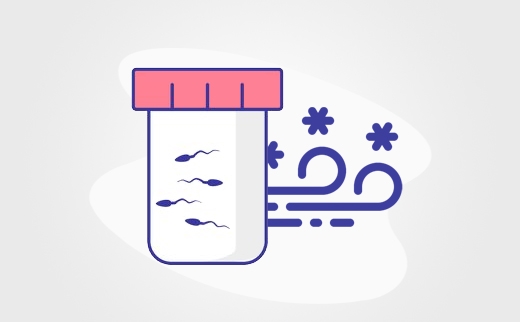
Sperm freezing is the method of collecting, analyzing and storing the sperm of a man for long periods after the freezing process, and using it for fertility treatments whenever desired. This overall process is known as cryopreservation.
The primary benefit of freezing sperm is to allow a man to preserve his fertility by using his sperm. Sperm cryopreservation delays fertility and paternity in men who need to preserve spermatozoa in order to have children at a later date.
These are the reasons that men cryopreserve their sperm:
Sperm is collected through masturbation. He can give sperm samples at home or in the clinic, but should only use an approved, sterile lubricant that doesn’t harm the sample quality.
An abstinence of sexual activity for approximately two to five days prior to the appointment provides the best possible specimen.
In men who has no sperm in semen specimen (azoospermia),sperm can be retrieved through surgical methods such as Percutaneous Epididymal Sperm Aspiration (PESA),Micro Epididymal Sperm Aspiration (MESA),Testicular sperm aspiration (TESA),Testicular sperm extraction (TESE) or Microscopic testicular sperm extraction (micro-TESE). The fresh sperm can either be used immediately at the same day of egg retrieval in an IVF-ICSI procedure and the spare sperm is cryopreserved to avoid the need to repeat the procedure or if the sperm will not be used for ICSI it can be frozen for use at a later time.
Cryopreserved specimens can be viable for long periods if processed and frozen properly. Sperm can remain preserved in liquid nitrogen for decades maintaining its integrity for when men are ready to start their family. Human sperm has been reported of cryofreezing up to 24 years without damage. Couple can achieve a healthy pregnancy even after sperm has been stored for many years prior to thawing.
Sperm is not damaged by freezing, and healthy babies have been born from sperm frozen for over a decade. To date, research indicates there is no increase in the rate of birth defects.
Sperm freezing has been successfully used since 1953 to help individuals conceive healthy babies. The process is safe, standardized and continues to improve as technology advances.
There is no risk or side effect of collecting semen samples through masturbation. If surgical extraction (PESA, TESA, MESA, TESE or micro-TESE) is required, there are small risks, as with any surgery, such as bleeding or discomfort.
The most important problem with sperm freezing is that not all sperm survive after freezing and thawing. The sperms retrieved after thawing may be less in number but the ability of surviving sperm to fertilize an egg after freezing and thawing process is the same as fresh sperm. High success rates is achieved in IVF-ICSI treatment with the frozen-thawed sperm.